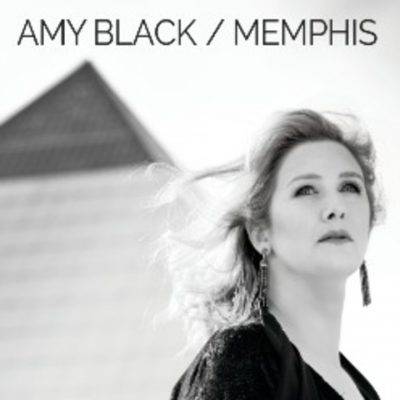Amy Black Memphis
Amy Black
Memphis
Reuben Records
Amy Black began her recording career as an alternative Country or Americana artist. In 2013 between her first and second albums Black released a four song EP called “The Muscle Shoals Session”. Recorded at the Fame studio that session spoke to her soul and Black changed her musical direction.
Black revisited the Fame studio and in 2015 she released a full length studio recording and called it “The Muscle Shoals Sessions”. That album included veteran musicians that crafted the Muscle Shoals sound including Spooner Oldham, Will Kimbrough, Charles Rose, and The McCrary Sisters. Also included were the horns of Jim Hoke, sax and Steve Herman, trumpet. Black had written three songs for that recording and also included selected covers of songs recorded by Sam Cooke, Mississippi Fred McDowell, Dan Penn, Etta James, Arthur Alexander and Bob Dylan.
Black had “found her musical sweet spot and knew her next stop had to be the place where blues and soul converge”. So she traveled from her home in Nashville to Memphis. This time Black enlisted Scott Bomar of The Bo-Keys to be her producer. The Bo-Keys are an instrumentally based band originally formed by Bomar in 1998 to back up the legendary Sir Mack Rice. The Bo-Keys included veteran musicians who had backed up O.V. Wright, Rufus Thomas, Al Green and others. In 2011 The Bo-Keys released “Got to Get Back” and it received a Blues Music Award nomination. In 2013 Bomar produced John Nemeth’s “Memphis Grease” and the album won a 2015 BMA as “Soul Blues Album of The Year”.
The band includes Howard Grimes or George Slippick, drums; The Reverend Charles Hodges or Al Gamble, piano and Hammond B-3; Leroy “Flick” Hodges, bass; Bobby Manuel or Joe Restivo, guitar; Marc Franklin, trumpet and horn arrangements; Kirk Smothers, tenor sax; and Art Edmaiston, baritone sax. Strings with arrangements by Franklin, were added were appropriate. Background singers include Reba Russell and Daunielle Hill. The album was recorded at Bomar’s Electrophonic Studios in Memphis.
Black composed seven new songs. Opening with “It’s Hard to Love an Angry Man”, the first instrument we hear is Gamble on the B-3. The saxophones of Smothers and Edmaiston are equally fine but it’s Black’s vocal that is most memorable. It’s a great song.
Edmaiston’s baritone sax and Franklin’s trumpet highlight “The Blackest Cloud” and it’s another great song. Franklin plays trumpet on the first bridge and Edmaiston solos on the second. The production by Bomar is fabulous as Franklin and Edmaiston close out the song.
“Without You” is definitive proof that Black is inspired. It’s another goodie. Once again Gamble is marvelous. “We Got a Good Thing” features a fabulous horn arrangement by Franklin and The Reverend Hodges on the B-3.
“Nineteen” opens with Restivo on acoustic guitar. A String arrangement featuring Jennifer Puckett, Viola; Jonathan Kirkscey, Cello; and violinists Jessie Munson and Yennifer Correia add to the drama as do the background singers. Once again Bomar’s production is meticulous.
There are also three wonderful covers. “If I Could Reach Out (and Help Somebody)” originally recorded on Hi Records by Otis Clay in 1973 is given a marvelous treatment. Once again The Reverend is on the B-3. The strings are arranged by Franklin and they complete the production.
“Further On Up The Road” is the classic first recorded by Bobby “Blue” Bland in 1957. Restivo is marvelous on rhythm guitar as is The Reverend on the piano. “I Need Your Love So Bad” written by Mertis John Jr. was first recorded by his brother William Edward “Little Willie” John in 1956.
Bet on Black; she has another winner in Memphis!
Richard Ludmerer
[amazon_link asins=’B06Y3BLD8J,B00YYOWXYE,B00IDQAZ9Y’ template=’ProductCarousel’ store=’maasc-20′ marketplace=’US’ link_id=’f56e0743-4f86-11e7-98ab-c5893acff005′]
Discover more from Making A Scene!
Subscribe to get the latest posts sent to your email.
















































